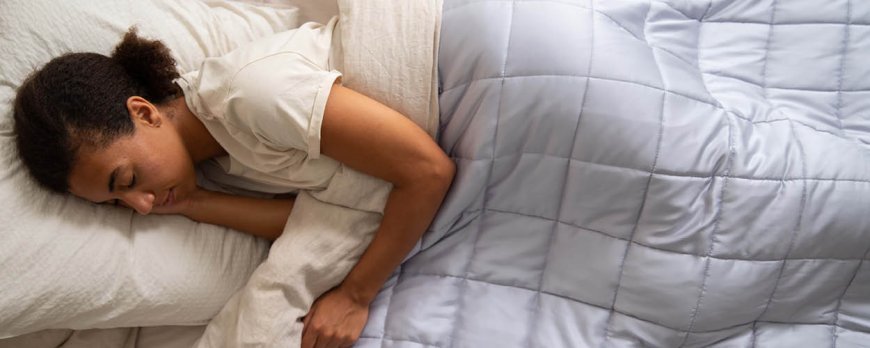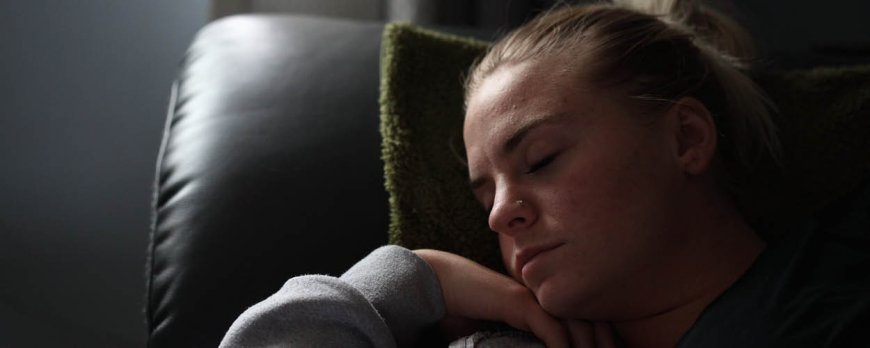How do you tell if you are getting enough sleep?
Uncover the signs of well-rested nights. 'How do you tell if you are getting enough sleep?' Learn to read your body's signals for a healthier, fuller life.

How do you tell if you are getting enough sleep?
Discovering whether you are getting enough sleep is crucial for maintaining a healthy and fulfilling life. To determine if you are getting sufficient rest, it is important to pay attention to various signs and symptoms that your body may be sending you. Lack of sleep can have significant effects on your overall well-being, including your physical health, cognitive abilities, and emotional state. By understanding the signs of well-rested nights and learning to read your body's signals, you can take steps towards achieving a healthier life.
Key Takeaways:
- Pay attention to physical signs such as skin health, immune system function, and the risk of developing acne or experiencing weight gain.
- Look out for signs of sleep deprivation around the eyes, including redness, puffiness, dark circles, bags, wrinkles, lines, and swelling.
- Be aware of the impact sleep deprivation can have on decision-making processes, leading to cravings for unhealthy snacks and meals.
- Difficulty waking up without an alarm clock may indicate sleep deprivation.
- Emotional and cognitive signs such as irritability, moodiness, difficulty concentrating, and memory problems can be indicators of insufficient sleep.
Physical Signs of Sleep Deprivation
Sleep deprivation can have visible effects on your physical appearance and overall well-being. Lack of sleep can impact various aspects of your body, including your skin, immune system, and even your weight. Here are some physical signs that may indicate sleep deprivation:
- Acne: Lack of sleep can trigger hormonal imbalances, leading to increased oil production and inflammation in the skin, which can contribute to the development of acne.
- Weight gain: Sleep deprivation can disrupt the regulation of hormones that control hunger and satiety, leading to increased cravings for unhealthy snacks and overeating.
- Redness, puffiness, and dark circles: When you don't get enough sleep, the blood vessels in your skin may dilate, causing redness and puffiness. Dark circles under the eyes can also become more prominent due to poor circulation.
- Wrinkles, lines, and swelling: Chronic sleep deprivation can accelerate the aging process, leading to the appearance of wrinkles and fine lines. It can also cause fluid retention and swelling, particularly around the eyes and face.
These physical signs are a result of the body's response to sleep deprivation. When you consistently lack sufficient sleep, your body's natural processes become disrupted, impacting your skin health, immune function, and overall well-being. It's important to prioritize quality sleep to maintain a healthy appearance and support your body's optimal functioning.
Remember: If you notice these physical signs and suspect sleep deprivation, it's essential to address your sleep habits and make necessary adjustments to ensure you are getting enough restful sleep.

Signs of Sleep Deprivation Around the Eyes
Your eyes can reveal a lot about your sleep quality, with various signs indicating sleep deprivation. Lack of sufficient sleep can manifest in physical symptoms around the eyes, such as redness, puffiness, dark circles, and bags. These signs are often caused by fluid retention, as the body struggles to regulate circulatory processes when it is sleep deprived. In addition, sleep deprivation can contribute to the appearance of wrinkles, lines, and swelling around the eyes, making you look tired and aged.
If you frequently wake up with red, puffy eyes, it may be a sign that you are not getting enough sleep. The blood vessels in the eyes can become dilated due to inadequate rest, causing the eyes to appear red and swollen. Along with this, dark circles may appear under the eyes, giving a tired and fatigued appearance. The skin in this area becomes thinner when sleep-deprived, which allows the underlying blood vessels and structures to become more visible, resulting in the appearance of dark circles.
In some cases, the lack of sleep can lead to the formation of bags under the eyes. When you are sleep deprived, the body retains more fluid and blood, which can accumulate under the eyes and cause puffiness. This fluid accumulation can also exacerbate the appearance of dark circles, making them more prominent. Alongside bags, you may also notice increased swelling around the eyes, as fluid retention affects the overall appearance and contour of the eye area.
- Redness and puffiness around the eyes
- Dark circles under the eyes
- Bags under the eyes
- Wrinkles, lines, and swelling
While these signs are not exclusively caused by sleep deprivation, they can serve as a helpful indicator of your sleep quality. Prolonged lack of sleep can not only affect your appearance but also impact your overall health and well-being. It is important to prioritize restful sleep and establish healthy sleep habits to avoid these signs of sleep deprivation around the eyes.
Impact on Decision-Making and Eating Habits
Insufficient sleep can influence your food choices and increase your cravings for unhealthy snacks and meals. When you are sleep-deprived, your brain's reward centers become more active, making you more likely to seek out pleasurable and indulgent foods. This can lead to a higher intake of sugary and fatty snacks, which can have detrimental effects on your health.
Here are some ways in which sleep deprivation can impact your decision-making and eating habits:
- Impaired judgment: Lack of sleep affects the prefrontal cortex, the part of the brain responsible for decision-making. This can impair your ability to make rational choices, leading you to opt for quick and unhealthy food options.
- Increased cravings: Sleep deprivation disrupts the balance of hormones that regulate hunger and satiety, such as ghrelin and leptin. As a result, you may experience an increase in appetite and cravings, especially for high-calorie and unhealthy foods.
- Emotional eating: When you are sleep-deprived, you may be more susceptible to emotional eating. Sleep loss can affect mood-regulating regions of the brain, making you more prone to seeking comfort in food, particularly unhealthy options.
To help mitigate the effects of sleep deprivation on your eating habits, consider the following strategies:
- Plan your meals: By pre-planning your meals and snacks, you can reduce the likelihood of making impulsive and unhealthy food choices. Opt for nutritious, well-balanced meals that provide sustained energy throughout the day.
- Stock up on healthy snacks: Replace unhealthy snacks with nutritious alternatives, such as fruits, vegetables, nuts, or yogurt. Having these options readily available can help satisfy cravings while providing essential vitamins and minerals.
- Practice mindful eating: Slow down and pay attention to your eating experience. Engage your senses, savor each bite, and listen to your body's hunger and fullness cues. This can help prevent overeating and promote a healthier relationship with food.
Remember, getting enough sleep is crucial for overall well-being, including maintaining healthy eating habits. Prioritize restful sleep and establish a consistent sleep routine to support your physical and mental health.
Difficulty Waking Up and Sleep Deprivation
Struggling to wake up without relying on an alarm clock may be a sign that you are not getting enough sleep. This difficulty can stem from the fact that your body is not adequately rested, and it is trying to compensate for the lack of sleep by clinging to those precious minutes of rest. If you find yourself hitting the snooze button repeatedly or feeling groggy and sluggish in the morning, it's time to evaluate your sleep patterns.
One of the reasons why waking up without an alarm clock is challenging when you are sleep-deprived is the disruption of your natural sleep cycles. These cycles include different stages of sleep, from light to deep sleep and REM sleep, which is essential for brain function and memory consolidation. When you don't get enough sleep, your body struggles to complete these cycles, leading to a feeling of incomplete rest upon waking.
To improve your ability to wake up naturally, it is crucial to prioritize sleep duration and quality. Establish a consistent sleep schedule by going to bed and waking up at the same time every day to regulate your body's internal clock. Create a sleep-friendly environment by ensuring your bedroom is dark, quiet, and at a comfortable temperature. Avoid electronic devices before bedtime, as the blue light can interfere with your natural sleep-wake cycle.
Exercise is another key factor in promoting restful sleep and making waking up easier. Regular physical activity can help regulate your sleep patterns, increase sleep quality, and reduce sleep disturbances. Additionally, incorporating relaxation techniques, such as deep breathing or meditation, into your nighttime routine can promote a calm and peaceful mind, enabling you to wake up more refreshed in the morning.

Emotional and Cognitive Signs of Sleep Deprivation
Sleep deprivation can significantly impact your emotional well-being and cognitive functioning. When you don't get enough sleep, you may find yourself becoming more irritable and moody. Your patience may wear thin, and even the smallest annoyances can trigger emotional outbursts. This can strain your relationships and make it difficult to cope with everyday stressors.
Difficulty concentrating is another common sign of sleep deprivation. You may have trouble staying focused on tasks or find that your mind wanders easily. This can hinder your productivity at work or school and make it challenging to complete even simple activities. Memory problems are also associated with lack of sleep. You may struggle to remember things, such as where you put your keys or what you need to buy from the grocery store.
Dealing with Sleep Deprivation
If you are experiencing these emotional and cognitive signs of sleep deprivation, it's important to prioritize getting better sleep. Here are some tips to help:
- Stick to a regular sleep schedule: Go to bed and wake up at the same time every day, even on weekends.
- Create a sleep-friendly environment: Make sure your bedroom is cool, dark, and quiet. Use comfortable bedding and invest in a good quality mattress and pillows.
- Exercise regularly: Engaging in physical activity can help regulate your sleep patterns and improve sleep quality.
- Ensure restful sleep: Avoid caffeine and heavy meals close to bedtime. Establish a relaxing bedtime routine, such as reading a book or taking a warm bath.
By incorporating these practices into your daily routine, you can improve your sleep quality and reduce the emotional and cognitive effects of sleep deprivation. Remember, getting enough sleep is not a luxury but a necessity for your overall well-being.
Sleep, Depression, and Mental Health
Poor sleep and depression are interconnected, with sleep deprivation having detrimental effects on your mental well-being. When you don't get enough sleep, it can disrupt your brain's functioning, affecting your mood, emotions, and cognitive abilities. One of the most significant signs of sleep deprivation is the impact it has on your concentration and memory. Studies have shown that even a slight decrease in sleep can impair your ability to focus and remember information accurately.
Furthermore, individuals who experience chronic sleep deprivation are more likely to develop symptoms of depression. Lack of sleep can lead to an imbalance in hormones and neurotransmitters in the brain, including serotonin, which plays a crucial role in regulating mood. The connection between sleep and depression is a two-way street, with poor sleep increasing the risk of developing depression and individuals with depression often experiencing difficulties in maintaining a healthy sleep pattern.
The Link Between Sleep, Concentration, and Memory
- Difficulty concentrating: Sleep deprivation can make it challenging to concentrate and pay attention to tasks, leading to decreased productivity and performance.
- Impaired memory: Lack of sleep can interfere with the consolidation of memories, making it harder to recall information accurately.
- Reduced cognitive function: Sleep deprivation affects various cognitive processes, including problem-solving, decision-making, and creativity.
It is essential to prioritize sufficient sleep to protect your mental well-being. By adopting healthy sleep habits and establishing a consistent sleep schedule, you can improve the quality and duration of your sleep. Creating a sleep-friendly environment, engaging in regular exercise, and practicing relaxation techniques can also contribute to restful sleep. Remember, a good night's sleep is not just a luxury; it is a fundamental requirement for maintaining a healthy mind and body.
Physical Symptoms Indicating Poor Sleep
Certain physical symptoms may be warning signs of inadequate sleep caused by underlying conditions. It is important to pay attention to these signs as they can indicate a need for improvement in sleep quality and duration. Here are some physical symptoms that may be indicative of poor sleep:
- Sore Throat: Waking up with a sore throat can be a sign of sleep breathing disorders such as sleep apnea. These disorders can disrupt your sleep, causing you to wake up frequently throughout the night and resulting in a sore throat in the morning.
- Dry Mouth: If you often wake up with a dry mouth, it could be a sign of mouth breathing during sleep. This can occur in individuals with nasal congestion or sleep apnea, leading to a dry and uncomfortable sensation upon waking.
- Headache: Frequent headaches upon waking can be a result of disrupted sleep patterns or sleep disorders. Poor sleep quality can contribute to tension headaches or migraines, making it important to address any underlying sleep issues.
- Sleep Apnea: Loud, chronic snoring accompanied by frequent pauses in breathing during sleep may be a sign of sleep apnea. This condition can greatly impact your sleep quality and result in daytime fatigue and other health complications.
- Acid Reflux: Acid reflux, also known as heartburn, can be exacerbated by poor sleep habits. Lying down after eating a heavy meal or snacking close to bedtime can lead to acid reflux symptoms, making it difficult to sleep comfortably.
If you experience any of these symptoms, it is advisable to consult with a healthcare professional to determine the underlying causes and appropriate treatment options. Addressing sleep issues and improving sleep quality can have a significant impact on overall well-being and daily functioning.
By recognizing and addressing physical symptoms related to poor sleep, you can take proactive steps towards achieving a better and more restful night's sleep. Prioritizing sleep health is crucial for your overall physical and mental well-being.
Tips for Ensuring Sufficient Sleep
Incorporating certain habits and practices into your daily routine can help you achieve sufficient and restful sleep. By following these tips, you can improve your sleep quality and overall well-being:
- Create a regular sleep schedule: Establish a consistent bedtime and wake-up time, even on weekends. This helps regulate your body's internal clock, making it easier to fall asleep and wake up naturally.
- Create a sleep-friendly environment: Make sure your bedroom is quiet, dark, and cool. Use blackout curtains, earplugs, or white noise machines to minimize any disruptions that could interfere with your sleep.
- Exercise regularly: Engaging in physical activity during the day can help promote better sleep at night. Aim for at least 30 minutes of moderate exercise most days of the week, but avoid intense workouts close to bedtime.
- Prioritize restful sleep: Establish a calming bedtime routine that signals your body it's time to wind down. This could include activities such as reading a book, taking a warm bath, or practicing relaxation techniques like deep breathing or meditation.
Additional Tips:
- Avoid caffeine and electronics: Limit your consumption of caffeine, especially in the afternoon and evening, as it can interfere with sleep. Additionally, avoid using electronic devices such as smartphones or tablets before bed, as the blue light emitted can disrupt your sleep cycle.
- Create a comfortable sleep environment: Invest in a supportive mattress and pillows and choose bedding that suits your personal preferences for comfort. Keep your bedroom clean and clutter-free to promote a sense of tranquility.
- Avoid large meals and excessive fluids: Eating heavy meals or consuming large amounts of fluids close to bedtime can lead to discomfort and disrupted sleep. Instead, opt for a light, balanced meal a few hours before bed and limit your fluid intake in the evening to prevent frequent nighttime awakenings.
- Manage stress: Practice stress management techniques, such as journaling, engaging in hobbies, or seeking support from friends or a therapist. Stress can significantly impact sleep quality, so finding healthy ways to cope can make a positive difference.
By incorporating these tips into your daily routine, you can improve your sleep habits and enjoy the benefits of sufficient, restful sleep. Remember, everyone's sleep needs are different, so listen to your body's signals and make adjustments as needed. Sweet dreams!

Conclusion: The Importance of Getting Enough Sleep
Adequate sleep plays a crucial role in maintaining your overall health and well-being, and it is essential to pay attention to the signs that indicate whether you are getting enough sleep. Sleep quality directly impacts your physical and mental health, and neglecting it can have long-term consequences.
When you are sleep-deprived, your body and mind suffer. Signs such as tired-looking skin, weakened immune system, and increased risk of acne and weight gain are indicators that you may not be getting enough rest. Additionally, you may notice physical signs around your eyes, such as redness, puffiness, dark circles, bags, wrinkles, lines, and swelling.
Sleep deprivation can also affect your decision-making processes, leading to cravings for unhealthy snacks and meals. If you find it difficult to wake up without relying on an alarm clock, it may be a sign that you are not getting sufficient sleep. Other symptoms like irritability, moodiness, difficulty concentrating, and memory problems can also be attributed to inadequate sleep.
The relationship between sleep and mental health is undeniable. Even a slight decrease in sleep can impact your concentration, memory, and increase the risk of depression. Additionally, physical symptoms like a sore throat, dry mouth, or headache may indicate poor sleep quality due to conditions like sleep apnea, snoring, or acid reflux.
To ensure you are getting enough sleep, it is recommended to establish a regular sleep schedule, create a sleep-friendly environment, exercise regularly, and prioritize restful sleep. By taking these steps, you can improve your sleep quality, leading to a healthier and more fulfilling lifestyle.
FAQ
How do you tell if you are getting enough sleep?
To determine if you are getting enough sleep, it is important to pay attention to various signs and symptoms. Lack of sleep can affect your skin, immune system, and hormones, leading to issues like acne and weight gain.
What are the physical signs of sleep deprivation?
Physical signs of sleep deprivation include redness, puffiness, dark circles, and bags under the eyes, as well as wrinkles, lines, and swelling.
How does lack of sleep impact decision-making and eating habits?
Sleep deprivation can impact decision-making, leading to cravings for unhealthy snacks and meals.
Can difficulty waking up indicate sleep deprivation?
Not being able to wake up on your own without an alarm clock may indicate sleep deprivation.
What are the emotional and cognitive signs of sleep deprivation?
Emotional and cognitive signs of sleep deprivation include irritability, moodiness, difficulty concentrating, and memory problems.
How does sleep deprivation relate to depression and mental health?
Depression and poor sleep are closely related, and even a small decrease in sleep can affect concentration and memory.
What physical symptoms may indicate poor sleep?
Physical symptoms like sore throat, dry mouth, or headache may indicate poor sleep due to conditions like sleep apnea, snoring, or acid reflux.
What are some tips for ensuring sufficient sleep?
To ensure you are getting enough sleep, it is recommended to stick to a regular sleep schedule, create a sleep-friendly environment, exercise regularly, and make sure your sleep is restful.





























































































































